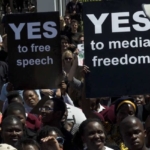
The news of the arrest of Blogger Samuel Amedeto came to me as a surprise.
Sammy is a very determined young man who always tries to do what is right and avoid trouble. I have known him from Dzodze, my hometown, and I have followed his passion for the media closely.
He entered the blogging space with remarkable enthusiasm, which won my admiration.
On the few occasions we met, I consistently encouraged him to give his best and nurture his passion.
Following his first arrest on Friday, some of our mutual friends reached out to me, and I made efforts to connect with him. He later returned my call and confirmed what had transpired, stating that it was related to a video he had posted on his platform.
He also mentioned that he disclosed his source to the police and was subsequently asked to go home.
I was relieved, confident that Sammy would not knowingly engage in any unlawful act.
I would later learn that he had been rearrested and detained after being called to pick up items that had been seized earlier.
I am informed that his bail hearing is scheduled for tomorrow.
However, beyond this particular incident, I would like to offer a perspective on the increasing number of cases involving new media players.
We must acknowledge, as a nation, that the world is moving at lightning speed in this era of technological advancement, and Ghana stands at the crossroads of that evolution.
These rapid changes come with uncertainties, and it is important that we manage them carefully, especially when it comes to the challenges posed by bloggers and vloggers.
Recently, I expressed concerns about the growing disregard for privacy by some new media outlets when covering events.
This is just one of many ethical issues emerging from their work.
Operating in the media and journalism space comes with a clear chain of ethical standards that must be respected not only to protect practitioners but also to safeguard the institutions and individuals they report on.
The first rule is verification. Good journalism thrives on verification.
When you ignore it, you expose yourself to accusations of spreading misinformation.
Unfortunately, we have failed as a country to recognise the rise of these new young media narrators and to create platforms to train, mentor, and guide them.
The Ghana Journalists Association, in particular, should have taken a keen interest in this emerging class of content creators, collaborated with them, and helped groom them to protect the sanctity of the profession.
I do not blame Sammy or the many young bloggers charting this path.
I blame us, the professionals, who either saw them as a threat or completely ignored their presence.
Meanwhile, the political class appears more focused on leveraging these young creators to score political points. During the last election, we all witnessed it. The two main political parties seemed to have their own groups of bloggers whom they engaged to spread misinformation and fake news.
It should not surprise anyone that the political class may now be using security institutions to silence press freedom.
Sammy was picked up from his house at dawn in Rambo style, with his doors damaged. The operatives arrived armed, refused to disclose their identities, and did not tell his co-tenants where he was being taken. His family had to move from one police station to another and visit National Security installations, searching for their son.
His recent detention only became public after the intervention of a whistleblower forced the police to issue a statement. This is unfair and unacceptable.
Regardless of the law on the publication of false news, the Constitution’s 48-hour rule must be strictly upheld. No individual should be detained beyond 48 hours without a court order. Any such detention is unconstitutional. The manner in which the young man was handled like a hardened criminal is an affront to freedom of speech, especially when civil remedies exist to address defamation and related harms.
The late Noah Dameh of Radio Ada and the McDan case are still fresh in our minds. His days in detention took a toll on him. When he came out sick, he never recovered. We cannot continue on this path.
My call is for the state to adopt a more progressive, corrective, and educational approach to this emerging challenge.
Instead of relying solely on punitive measures, we should invest in systems that train, guide, and integrate new media practitioners into the broader communication ecosystem. The National Media Commission and the Ghana Journalists Association must take up this issue.
This is how we build a responsible, ethical, and forward-looking media environment that supports national development without stifling young talents.
–
The writer King Nobert Akpablie is a Technology Media and Telecommunications (TMT) Advocate. For further comments, reach him at kingnobert2@gmail.com.